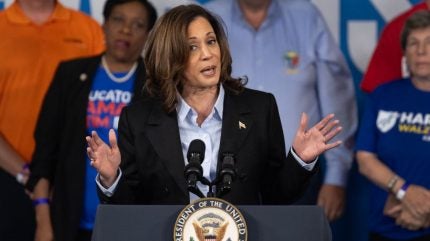
“US Steel is a historic American company, and it is vital for our nation to maintain strong American steel companies,” Democratic presidential nominee Vice President Kamala Harris said on Monday at a Labour Day event in Pittsburgh.
Harris is referring to the controversial $15bn offer from Japanese Nippon Steel to take over 123-year-old American company, US Steel. In December of 2023, the companies announced that they had agreed on the sale, with a price that had a 40% premium to US Steel’s share price at the time.
The deal was automatically opposed by the United Steel Workers, who said Nippon Steel did not consult with union leaders during negotiations.
Bipartisan opposition
The deal faces opposition from Democrats and Republicans alike.
Republican presidential candidate former President Donald Trump said that he would “block it instantaneously,” if he were elected in November. “We saved the steel industry. Now, US Steel is being bought by Japan. So terrible, but yeah, we want to bring jobs back to the country,” he commented in January.
At the same Labour Day event as Harris on Monday, President Biden said “I made it clear the last time I was in Pittsburgh: United States Steel, an iconic American company for over a century, is going to remain an American company.”

US Tariffs are shifting - will you react or anticipate?
Don’t let policy changes catch you off guard. Stay proactive with real-time data and expert analysis.
By GlobalDataThe United Steelworkers have welcomed the support. The union is based in Pennsylvania, a battleground state that will be key for either of the candidates’ path to victory.
US-Japan relations
The deal is still a long way away and will likely be dealt with after the election. If passed, the deal could have implications for the global steel industry and for US-Japanese economic relations.
Nippon Steel has framed the deal as an opportunity to strengthen both Japan’s and the US’s stance in an industry dominated by China. Given that reigning in China’s influence and power is a priority for both countries, it could have been a persuasive argument under different circumstances.
China recently threatened to retaliate against Japan after it took steps to align its chip policy with the US’s. The extent of American influence in Japanese economic policy has been felt with some discomfort in the country, as some felt stronghanded by their ally.
Both cases show the complications of aligning foreign policy and domestic sovereignty in the global effort to limit China’s economic influence.



